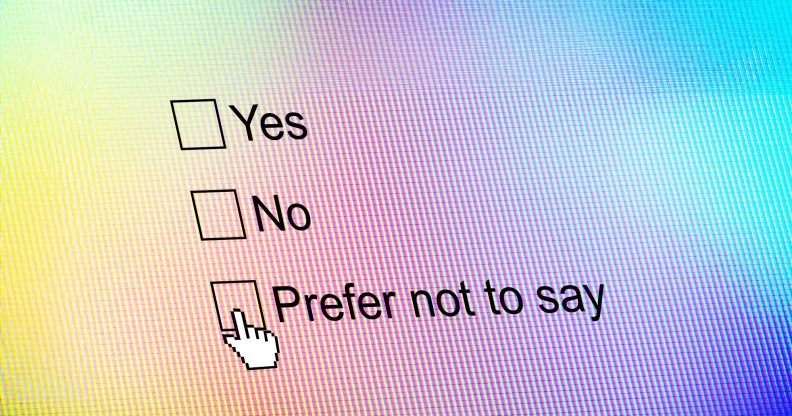Should you ever choose ‘Prefer Not to Say’ on a question form?

Should you answer ‘Prefer Not to Say’ on question forms? (Getty/PinkNews)
The hiring process has transformed in recent years. Gone are the days of simply submitting a CV and cover letter. While these are still requested, they’re often now accompanied by personal multiple-choice questions about gender, ethnicity, preferred pronouns, disability, sexual orientation – the list goes on.
Those new to the job-hunting process or those that have been out of it for a few years may be surprised at the level of questioning that some firms put out on their job application forms.
For some in the LGBTQ+ community, questions around sexuality, gender and preferred pronouns may seem intrusive and some may even be forgiven for wondering if providing honest answers could count against them.
Most companies do offer ‘Prefer Not to Say’ as an answer in their multiple-choice questions. But could choosing this option leave recruiters to make up their own mind, which could still be shaped by their own biases and opinions?
While progress has been made when it comes to inclusivity in the workplace, there is still much work to do. So, what kind of impact can it have if LGBTQ+ job applicants opt for this choice?
Diversity monitoring and the law
It may feel tempting not to reveal too much if you feel it could be counted against you. But before clicking on the ‘Prefer Not to Say’ option it’s best to understand the reasons behind why companies are collecting this information.
Legally, there’s no requirement to conduct diversity monitoring, but it is a recommendation under Equality and Human Rights commission (EHRC) Statutory Code of Practice and more companies want to adhere to it because they’ve become increasingly aware of the negative impact of using inappropriate language.
Under UK law, companies with 250 or more employees are required to report annually on their gender pay gap and therefore must keep a record of the gender of their employees. While this reporting only covers “men” and “women”, employers are increasingly recognising wider gender identities. Therefore, having access to diversity data could be useful in the future when the law catches up.
Aren’t questions from companies about your personal identity suspicious?
There should be no sinister reason behind why companies collect such data. This data, if asked and stored correctly, can be an effective tool for diversity monitoring.
Many employers are increasingly focusing on improving diversity in their teams but to ensure they are doing so they have no choice other than to measure it. Therefore withholding such information could, instead, hinder the data collection process.
“Many HR teams are increasing efforts to make the hiring process more inclusive, however without knowing how inclusive the process actually is (both in finding LGBTQ+ candidates to interview and in treating them fairly), their efforts can only extend so far,” points out Aimee Treasure, marketing director at Templeton Recruitment.
Treasure believes that this data could also be useful in combating unconscious bias. “Unconscious bias is often the biggest hurdle to following through with an inclusive interview process: most people will unconsciously show preference to others who they perceive to fit their background, social group and character.
“Data doesn’t lie: gathering information on candidate gender and sexuality is proof of any bias within the hiring process, from whether an employer is attracting enough diverse applicants, to which percentage of these applicants reach interview and offer stage compared to heterosexual and cisgender peers with similar skill sets, to the success of diverse applicants in the business itself, and what an employer needs to do to improve across hiring and inclusivity,” she adds.
Avoiding ‘Prefer Not to Say’ and answering the question can make a real impact
So, what should job seekers do when faced with these questions? Arv Kaushal, equality, diversity and inclusion manager for Milton Keynes College Group, advises candidates to ‘own’ the answer.
“Express your preferences pronoun-wise even if they are different to your assigned gender at birth. If it’s the right organisation for you, and to give you the best chance of feeling like you belong in that company you’re proud to work for, you won’t be at a disadvantage.”
Author and leadership expert, Ashley T Brundage, adds: “Be as bold as you are comfortable with being because you don’t want to work somewhere when you have to hide part of who you are. This only leads to not being productive and lowers the corporate revenue and it lowers your chances of promotion and career advancement.”
While the onus is on companies to adapt, by being truthful on such questionnaires LGBTQ+ individuals have an indirect ability to exact change and ensure that they are fairly represented and fairly paid in the workplace – now and in the future.
How did this story make you feel?

